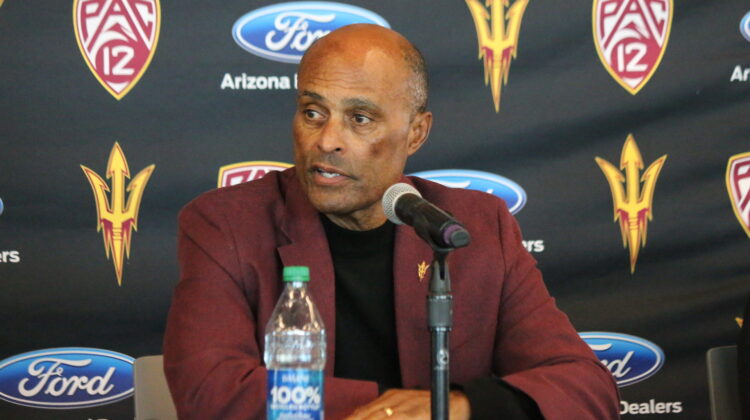He doesn’t.
Arizona State’s controversial athletic director announced his resignation Monday, effective immediately.
So ends a nine-year reign that featured the standard array of hits and misses typical of college sports administration, along with a blunder for the ages that will define his legacy in Tempe.
The architect of the Herm Edwards Experiment had a partner, of course: ASU president Michael Crow signed off on all the major decisions, including the bowl ban announced days before the start of the season.
But Crow’s the big boss and has done first-rate work for the university. Anderson was responsible for oversight of the football program and bears responsibility for hiring Edwards, his friend and former business partner, and for the NCAA recruiting transgressions that have engulfed the program for two-and-a-half years.
News of Anderson’s resignation sparked the type of unrestrained joy on social media typically reserved for the dismissal of losing coaches.
But Anderson’s actions, demeanor and decisions over the years alienated many constituents. It’s no coincidence that the school’s NIL arm, the Sun Angel Collective, set a single-day record Monday for new members, according to SunDevilSource.com.
The timing and wording of the announcement were curious. Why Monday instead of immediately following the regular season? Or instead of any day in the past two years?
The “effective immediately” piece certainly suggests it wasn’t Anderson’s call — that he’s going out on Crow’s terms, not his own.
Our presumption is the move connects directly and deeply to the NCAA recruiting violations, as opposed to general mismanagement of football specifically and athletics generally.
ASU has often been described as a “sleeping giant” within college athletics. We view the situation differently. It’s more like the Sun Devils are in a prolonged, medically-induced coma resulting from so many self-inflicted wounds over the decades. (ASU has committed nine major NCAA violations over the course of decades, more than any Power Five school.)
Yes, the business model established by Crow — with the massive online education program and the sprawling real estate ventures — has allowed the university to subsidize athletics with more than $20 million annually.
Yes, the huge enrollment (about 60,000 students in Tempe) creates a base of student support for athletics.
And the improvement in high school football across metropolitan Phoenix has led to a bevy of blue-chip prospects within a short drive of campus.
Put another way: ASU has a well-resourced athletic department in a huge media market with an enormous alumni base and in-state talent.
For those reasons and more, including Crow’s willingness to pay his athletic director well — Anderson earned about $1 million annually — the Sun Devils will have a deep, impressive candidate pool.
Make no mistake: It’s a coveted job.
But it’s also more difficult than the view from afar would suggest, with lasting traction in Phoenix’s pro-sports market being ASU’s white whale.
The Sun Devils would be well served to hire a candidate who knows the school and the area, who’s thoroughly engaging and endlessly energetic — the administrative version of football coach Kenny Dillingham, an ASU graduate hired by Anderson and Crow last year.
But at the very least, Crow must hire an athletic director who understands the playing field, who can lean on industry contacts and experience as college sports undergoes unprecedented change.
The Sun Devils are entering the Big 12 next summer, but that’s merely a chapter in the story. Anderson’s replacement must position ASU for the next round of upheaval later this decade or early in the 2030s.
Crow is the wild card in the process.
He hired Anderson, a former sports agent and NFL executive.
He signed off on the Edwards experiment and the ‘New Leadership Model.’
He supported former Pac-12 commissioner Larry Scott’s failed policies and steered the conference straight toward the cliff.
He justifiably takes immense pride in his reputation as an innovator in transforming ASU into a post-modern national university.
But in this case, Crow must resist his instincts.
Arizona State needs the anti-Anderson.
It needs someone who will connect with the community, not alienate the constituents.
It needs someone who will prepare for the future, not hire business partners from the past.
It needs someone who will embrace pragmatism, solve problems, shun hubris and position the Sun Devils to thrive in a dynamic landscape.
After all, Anderson’s attempt to reinvent the wheel is the reason ASU football crashed and burned.
The Sun Devils have a chance to thrive if they can just, for once, stay out of their own way.
Here’s an outside-the-box idea for Crow: Hire an AD from inside college sports.
*** Send suggestions, comments and tips (confidentiality guaranteed) to pac12hotline@bayareanewsgroup.
*** Follow me on Twitter: @WilnerHotline
*** Pac-12 Hotline is not endorsed or sponsored by the Pac-12 Conference, and the views expressed herein do not necessarily reflect the views of the Conference.
Related posts:
 Wilner Hotline – Sunday Judgements Around Pac-12
Wilner Hotline – Sunday Judgements Around Pac-12  Wilner Hotline – Thanksgiving Day Pac-12 Doings
Wilner Hotline – Thanksgiving Day Pac-12 Doings 
Arizona center Oumar Ballo (11) goes to the basket in front of Arizona State guard Devan Cambridge (35) (AP Photo/Chase Stevens)
Pac-12 men’s basketball: Selection Sunday preview for the two NCAA Tournament locks and three bubble teams
Arizona State coach Bobby Hurley (AP Photo/Rick Scuteri)
Hurley contract extension the right move…
